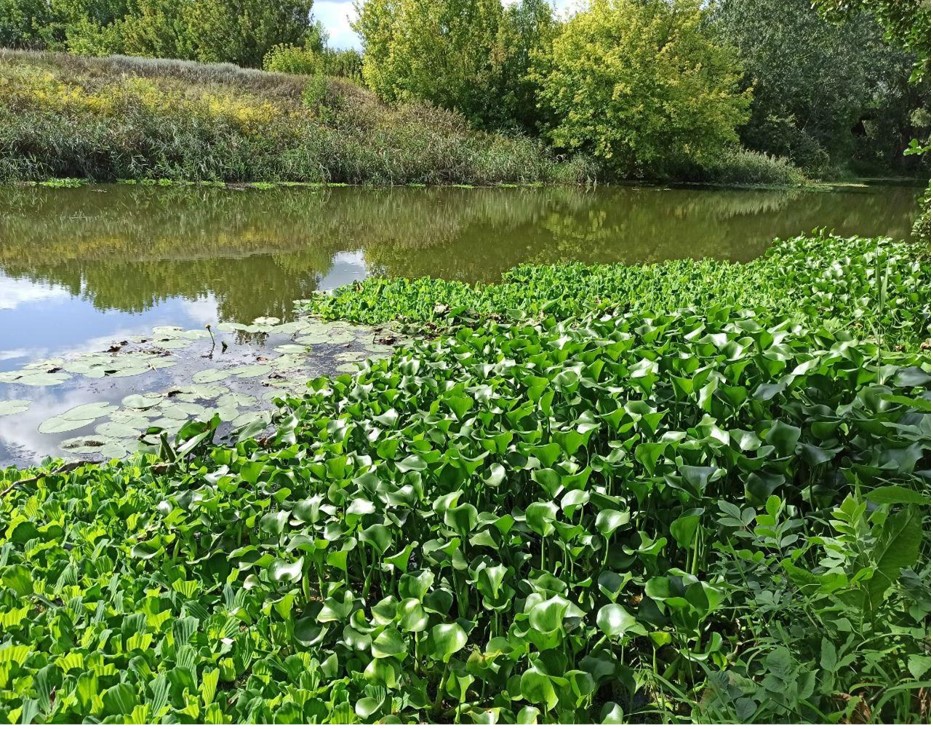Phytocenotic and ecological characteristics of the alien species Pistia stratiotes L. and Pontederia crassipes Mart. in urban river ecosystems (Ukraine)
DOI:
https://doi.org/10.3986/hacq-2025-0007Keywords:
alien plants, macrophytes, invasion, urban river ecosystemsAbstract
Pistia stratiotes L. and Pontederia crassipes Mart. are alien species used in aquarism and aquaculture with a high invasive capacity. The aim of the study was to establish phytocenotic and ecological features of populations of these species in urban river ecosystems. The research was conducted in 2014–2023 on water bodies of the Kharkiv city, Ukraine. Local populations of these species were found in three rivers and vegetation relevés were carried out according to standard phytosociological methods. Alien species occurred with high constancy in the communities of Lemnetea O. de Bolòs et Masclans 1955 and with a minor occurrence in fragments of communities of Phragmito-Magnocaricetea Klika in Klika et Novák 1941. The obtained results of phytoindication show a variability of humidity, aeration, and thermal regime in which the populations of these species occur. The environmental characteristics such as low temperatures, light, salt and nitrogen regime are limiting for occurrence of populations. Climatic and hydrological conditions of the city’s river ecosystems of the city are favorable for spread of communities with the present Pistia stratiotes L. and Pontederia crassipes Mart.
Downloads
References
Adebayo, A. A., Briski, E., Kalaci, O., Hernandez, M., Ghabooli, S., Beric, B., Chan, F. T., Zhan, A., Fifield, E., Leadley, T. & MacIsaac, H. J. (2011). Water hyacinth (Eichhornia crassipes) and water lettuce (Pistia stratiotes) in the Great Lakes: playing with fire? Aquatic Invasions, 6(1), 91–96. https://doi.org/10.3391/ai.2011.6.1.11
Attionu, R. H. (1976). Some effects of water lettuce (Pistia stratiotes L.) on its habitat. Hydrobiologia, 50(3), 245–254. https://doi.org/10.1007/BF00020998
Benhus, Yu. V., & Neko, D. V. (2023). Znakhidky chuzhoridnykh vydiv roslyn na terytorii mista Kharkova i Kharkivskoi oblasti. Znakhidky chuzhoridnykh vydiv roslyn ta tvaryn v Ukraini. Seriya: «Conservation Biology З-75 in Ukraine», 29, 50–56. https://uncg.org.ua/znakhidky-chuzhoridnykh-vydiv-roslyn-ta-tvaryn-v-ukraini/
Braun-Blanquet, J. (1964). Pflanzensoziologie. Grundzüge der Vegetationskunde. Springer.
Coetzee, J. A., & Hill, M. P. (2012). The role of eutrophication in the biological control of water hyacinth, Eichhornia crassipes, in South Africa. BioControl, 57, 247–261. https://doi.org/10.1007/s10526-011-9426-y
Coetzee, J. A., Hill, M. P., Ruiz-Téllez, T., Starfinger, U., & Brunel S. (2017). Monographs on invasive plants in Europe N° 2: Eichhornia crassipes (Mart.) Solms, Botany Letters 164(4), 303–326. https://doi.org/10.1080/23818107.2017.1381041
Didukh, Ya. P. (2011). The ecological scales for the species of Ukrainian flora and their use in synphytoindication. Phytosociocentre. https://www.botany.kiev.ua/doc/diduh_monog.pdf
Dubyna, D. V., Dziuba, T. P., Dvoretzkiy, T. V., Zolotariova, O. K., Taran, N. Yu., Mosyakin, A. S., Iemelianova, S. M., Kazarinova, G. O. (2017). Invaziini vodni makrofity Ukrainy. Ukrainian botanical journal, 74(3), 248–262. https://doi.org/10.15407/ukrbotj74.03.248
Dubyna, D. V., Dziuba, T. P., Yemelianova, S. M., Bagrikova, N. O., Borysova, O. V., Borsukevych, L. M., Vynokurov, D. S., Gapon, S. V., Gapon, Yu. V., Davydov, D. A., Dvoretsky, T. V., Didukh, Ya. P., Zhmud, О. І., Kozyr, М. S., Konіshchuk, V. V., Kuzemko, A. A., Pashkevych, N. А., Ryff, L. Е., Solomakha, V. A., … Iakushenko, D. M. (2019). Prodromus roslynnosti Ukrainy. Naukova dumka. http://geobot.org.ua/files/publication/2106/prodr_roslinn_ukr_2019.pdf
Gamulya, Yu. G., & Zvyagintseva, К. A. (2010). Osobennosti zonirovaniya mestoobitaniy prirodnoy i antropogennoy rastitel'nosti g. Kharkova. The Journal of V. N. Karazin Kharkiv National University. Series «Biology», 11(905), 43–54. http://seriesbiology.univer.kharkov.ua/ukr/11(2010)/pdf/43.pdf
Global Invasive Species Programme (2001). Global Strategy on Invasive Alien Species. Convention of Biological Diversity, SBSTTA Sixth Meeting. Montreal. www.biodiv.org
Hennekens, S. M., & Schaminée, J. H. J. (2001). TURBOVEG, comprehensive data base management system for Vegetation data. Journal of Vegetation Science, 12(4), 589–591
Jaklič, M., Koren, Š. & Jogan, N. (2020). Alien water lettuce (Pistia stratiotes L.) outcompeted native macrophytes and altered the ecological conditions of a Sava oxbow lake (SE Slovenia). Acta Botanica Croatica, 79(1), 35–42. https://doi.org/10.37427/botcro-2020-009
Kazarinova, H. O. (2016). Syntaksonomiya, antropohenna dynamika ta okhorona vyshchoi vodnoi roslynnosti dolyny r. Siverskyi Donets. Avtoref. dys. na zdobuttia nauk. stupenia kand. biol. nauk: spets. 03.00.05 «Botanika». https://nrat.ukrintei.ua/searchdoc/0416U001553/
Kazarinova, H. O. (2023). Alien species Pistia stratiotes L. and Eichhornia crassipes (Mart.) Solms in Kharkiv, Ukraine. VI Scientific and Practical Conference of Young Scientists "Modern Hydroecology: The Role of Scientific Research in Addressing Current Issues" (10-11 October 2023, Kyiv), 57–60. http://hydrobio.kiev.ua/images/zbirka_confer2023.pdf
Karpets, K. M. (2008). Otsinka stanu malykh richok terytorii Kharkova (na prykladi r. Nemyshlya). Visnyk of V. N. Karazin Kharkiv National University, series "Geology. Geography. Ecology", 770, 183–189. https://www.researchgate.net/publication/336362867_Ocinka_stanu_malih_ricok_teritorii_Harkova_na_prikladi_r_Harkiv
Kriticos, D. J., & Brunel, S. (2016). Assessing and Managing the Current and Future Pest Risk from Water Hyacinth, (Eichhornia crassipes), an Invasive Aquatic Plant Threatening the Environment and Water Security. PLoS ONE, 11(8), Article e0120054. https://doi.org/10.1371/journal.pone.0120054
May, S. (2006). Invasive Aquatic and Wetland Plants (Invasive Species). Chelsea House.
Mosyakin, A. S., & Kazarinova, H. O. (2014). Modelyuvannya invaziynoho poshyrennya Pistia stratiotes (Araceae) na osnovi GIS-analizu klimatychnykh faktoriv. Ukrainian Botanical Journal, 71(5), 549–557. https://doi.org/10.15407/ukrbotj71.05.549
Pistia stratiotes L. (2017). EPPO Bulletin, 47(3), 537–543. https://doi.org/10.1111/epp.12429
POWO (December 11, 2023). Plants of the World Online. Facilitated by the Royal Botanic Gardens, Kew. http://www.plantsoftheworldonline.org
Prokopuk, M., Zub, L., & Bereznichenko, Y. (2021). A City as a Source of Introduction for Tropical Alien Species (Egeria densa Planch., Pistia stratiotes L. & Eichornia crassipes (Mart.) Solms) in Natural Ecosystems with a Temperate Climate. Research Square. Preprint (Version 1). https://doi.org/10.21203/rs.3.rs-1095787/v1
Prokopuk, M., & Zub, L. (2022). Ecological features of the alien species Pistia stratiotes L. in different habitats of the secondary distribution range (Ukraine). Hacquetia, 21(2), 361–370. https://doi.org/10.2478/hacq-2022-0001
Sierra-Carmona, C. G., Hernández-Orduña, M. G., & Murrieta-Galindo, R. (2022). Alternative Uses of Water Hyacinth (Pontederia crassipes) from a Sustainable Perspective: A Systematic Literature Review. Sustainability, 14(7), 3931. https://doi.org/10.3390/su14073931
Shvebs, H. I., & Ihoshyn, M. I. (2003). Kataloh richok i vodoim Ukrainy. Navchalno-dovidkovyi posibnyk. Astroprynt
Tichý, L. (2002). JUICE, software for vegetation classification. Journal of Vegetation Science, 13(3), 451–453. https://doi.org/10.1111/j.1654-1103.2002.tb02069.x
Zviahintseva, K., Kazarinova, H., Abramova, G., & Mashtaler, O. (2023). Ecological features and anthropogenic transformation of wetlands as part of urban floras of Ukraine. Acta Biologica Universitatis Daugavpiliensis, 23(1), 13–27. https://doi.org/10.59893/abud.23(1).002

Downloads
Published
How to Cite
Issue
Section
License
Copyright (c) 2024 ZRC-SAZU

This work is licensed under a Creative Commons Attribution 4.0 International License.
Authors guarantee that the work is their own original creation and does not infringe any statutory or common-law copyright or any proprietary right of any third party. In case of claims by third parties, authors commit their self to defend the interests of the publisher, and shall cover any potential costs.
More in: Submission chapter












